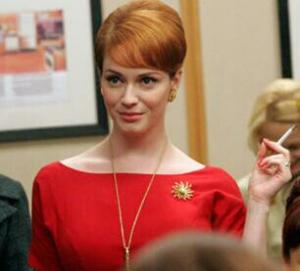 Thinking about the new season of “Mad Men” has put me in the mood for some more Mid-Century Modern film fare. Watching Seasons 1 and 2 of “Mad Men” on DVD with the amazing detailed commentary from show creator Matt Weiner reminded me what great movies came out of the late 1950s and early 1960s that also capture the look and feel of the time without the benefit of 20/20 hindsight. While waiting for Season 3 to premiere on AMC this Sunday, I’m revisiting some of my favorite films of the period:
Thinking about the new season of “Mad Men” has put me in the mood for some more Mid-Century Modern film fare. Watching Seasons 1 and 2 of “Mad Men” on DVD with the amazing detailed commentary from show creator Matt Weiner reminded me what great movies came out of the late 1950s and early 1960s that also capture the look and feel of the time without the benefit of 20/20 hindsight. While waiting for Season 3 to premiere on AMC this Sunday, I’m revisiting some of my favorite films of the period:
1. The Apartment (1960) This is the movie Joan Halloway (Christina Hendricks, at left) references near the end of her relationship with Roger Sterling (John Slattery). Billy Wilder’s classic (and winner of the Oscar for Best Picture) about office politics stars Jack Lemon, Shirley MacLaine, Fred MacMurray and a slew of great character actors you’ll recognize from every classic movie and TV show you’ve ever seen. McLaine is the elevator operator from Brooklyn (or the branch manager from Kansas City depending on your perspective) who’s having an affair with MacMurray, the CEO of a large Manhattan corporation. Lemon is the junior executive who lends his apartment to dallying executives in exchange for some help moving up the corporate ladder. Mad Men fans will appreciate the pathos of the office Christmas party and Lemon’s memorable wait outside that hot new Broadway show “The Music Man.” If you haven’t seen this movie, do see it, if you have, it’s worth seeing again.
2. The Best of Everything (1959) This movie comes with a great backstory. Radcliffe grad and publishing-peon- made-good Rona Jaffe sold the movie rights to her bestselling book before the book had even been written. The movie chronicles four working girls setting out to make their fortunes in the Big City where there seem to be only two paths: Marriage and Happiness or Miserable Man-Less Success in the Workplace. In 1960, being good at your job meant being single, childless and probably ugly. Hope Lange plays a prettier Peggy Olson who works her way up from the steno pool with Joan Crawford as her single and unhappy boss. If you rent the DVD, Jaffe’s comments along with that of a female film historian are a definite must. Jaffee recalls the publishing world of the 1960s and talks about Manhattan on a secretary’s budget. Things to watch for: the iconic abortion scene and subsequent melodramatic happy ending (which Jaffee fought against and lost); Supermodel Suzy Parker as a lovelorn actress and Robert Evans (who went on to producer fame and is profiled in “The Kid Stays in the Picture”) playing a character I believe is another Pete Campbell prototype. One of the interesting things about revisiting these period films is how prevalent the Pete “type” is in movies and books of the era. And keep an eye out for the winner of the “Miss Best of Everything” Contest winner who gets a walk-on part in the film. Lange’s character Caroline Bender gives directions to the winner halfway through the movie.
3.Born Yesterday (1950). One of that year’s top grossing films, “Born Yesterday” is a classic even though it takes place about 10 years before “Mad Men.” Judy Holiday gives a brilliant performance a the showgirl consort of a corrupt New Jersey junkyard millionaire (Broderick Crawford in an excellent pre-cursor to Tony Soprano) who learns about history and much more when Crawford hires a journalist (a dashing and dreamy William Holden) to “give her some class” to impress his new DC associates. Holiday’s clothes are very “I Love Lucy” and her gradual awakening is inspiring, but it illustrates a key point about how limited women’s options were and what most men expect of their wives and girlfriends. Holiday is like a mid-century Eliza Doolittle, who finds herself, but loses her place in a world of very limited options for women. She does live happily ever after, though and drives off into the sunset at the film’s end.
Mixers for moderns: If you’re looking for the perfect libation to have while watching these classic period films, the Wall Street Journal talks with Mad Men’s cocktail historian about making sure the cocktails and the scotch are period correct.

